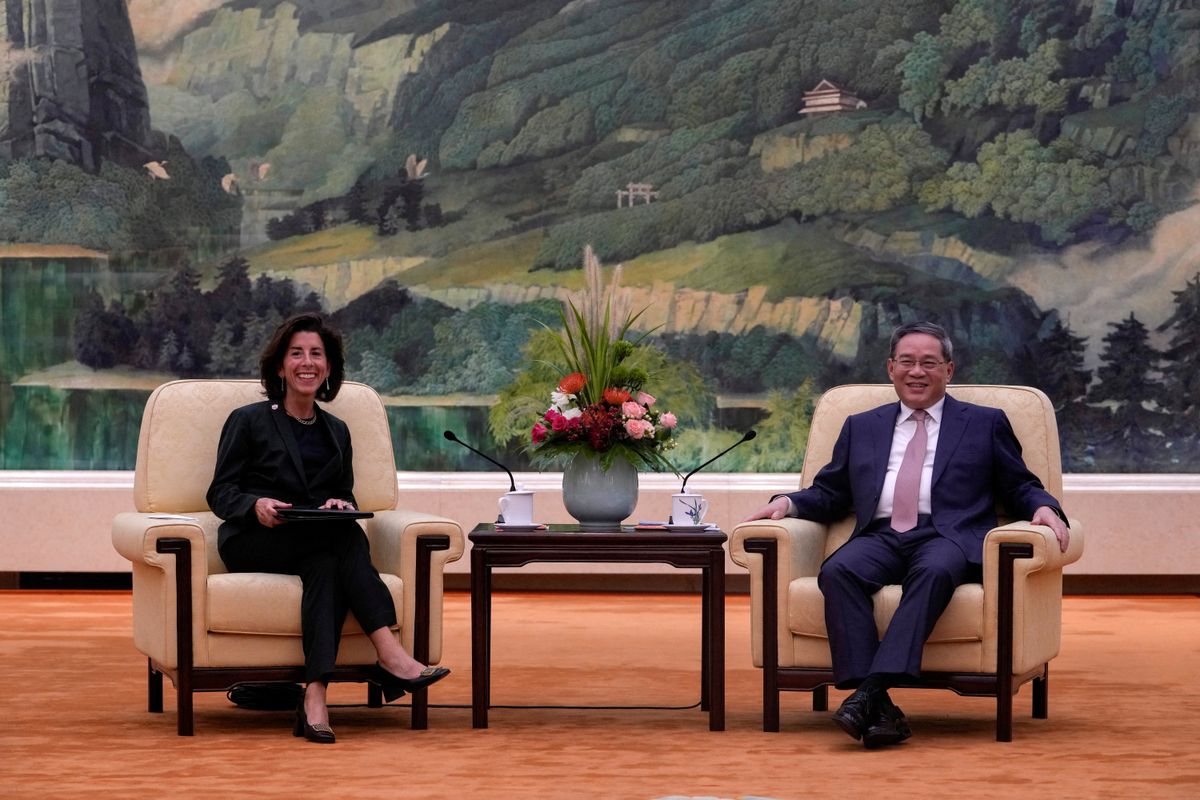A closer look at efforts to strengthen US-China business ties
This week, US Commerce Secretary Gina Raimondo visited Beijing, with her trip scheduled to wrap up on Wednesday.

A few minutes every morning is all you need.
Stay up to date on the world's Headlines and Human Stories. It's fun, it's factual, it's fluff-free.
The backstory: Tensions between China and the US have been escalating, driven by a series of issues that have strained their relationship. Last October, the US imposed restrictions on Chinese companies, requiring them to obtain licenses for high-tech US chips and chip-making equipment. This triggered a chain reaction of moves aimed at tightening the flow of technology to China. In response, China initiated a cybersecurity investigation into Micron, a major player in the US chip industry, expressing concerns about security risks and accusing the US of mixing business with politics. It also introduced curbs on gallium and germanium exports, which are essential components in electronics and chipmaking.
Against the backdrop is China's slowing economy. The nation's growth rate, originally targeted at 5.5%, is now predicted to possibly fall below 5%. So, to give the economy a boost, China has been looking for more foreign investment. In fact, Chinese Premier Li Qiang met with the US-China Business Council last week, emphasizing China's commitment to treating foreign-funded businesses the same as domestic ones. Notably, key figures from the Biden administration, including Treasury Secretary Janet Yellen and Secretary of State Antony Blinken, have also visited China this year, underscoring the importance of these discussions.
More recently: Earlier this year, US Commerce Secretary Gina Raimondo revealed that over 200 Chinese companies had been added to a US export control list. Raimondo has been vocal about using this authority as necessary. Then, the White House came out with new rules putting restrictions on investments from US venture capital and private equity firms in Chinese artificial intelligence (AI), quantum computing and semiconductors.
In a surprising turn, the Commerce Department in Washington announced last week that export controls had been relaxed for 27 Chinese companies after evaluations of their products to ensure compliance. China welcomed this move, emphasizing its contribution to promoting "normal trade" between the two nations.
The development: This week, Raimondo visited Beijing, with her trip scheduled to wrap up on Wednesday. Following conversations with Chinese Commerce Minister Wang Wentao, both sides agreed to improve communication and cooperation between their economies. The goal is to build a stronger economic relationship, recognizing how important this is on a global scale.
A tangible outcome from these talks is the establishment of a commercial issues working group that will bring together officials and business representatives from both countries to come up with solutions when it comes to trade and investment hiccups. This working group will meet twice a year, with the US hosting the first meetup early next year.
Both countries also promised to share info about enforcing export controls. The idea is to clear up any misunderstandings about national security policies and make things more transparent. Raimondo's been clear that national security won't be compromised as they talk things out.
Key comments:
“The economic relationship between the United States and China is one of the most significant in the world. We share over US$700 billion of trade,” said US Commerce Secretary Gina Raimondo as she kicked off the meeting in Beijing.
“It is entirely possible to find a solution that benefits companies on both sides,” said China’s Ministry of Commerce in a statement last week.
“China’s aging demographics present significant challenges to its economic growth potential,” said analysts from Moody’s Investors Service in a research report this month. “Housing demand will fall in the long term,” they added.
“Tensions between the countries had already pressured US [venture capital] investment into China and overall activity had been waning for several quarters,” according to Kyle Stanford and Kaidi Gao, analysts at PitchBook.




Comments ()